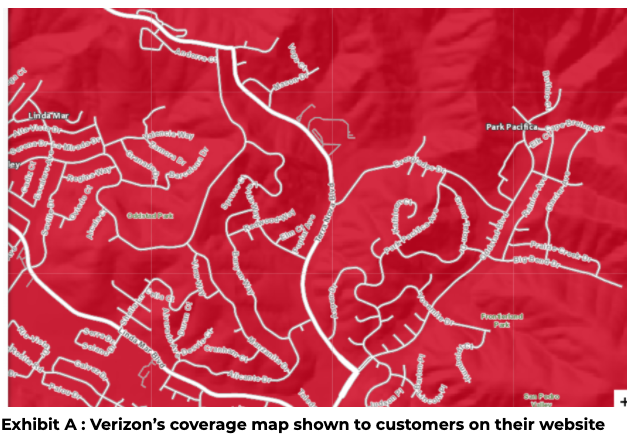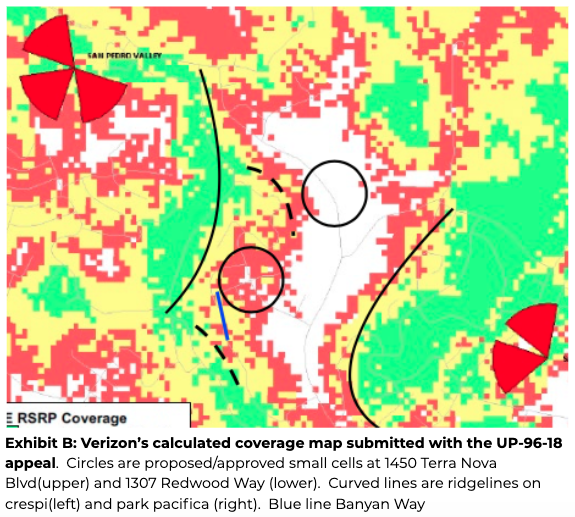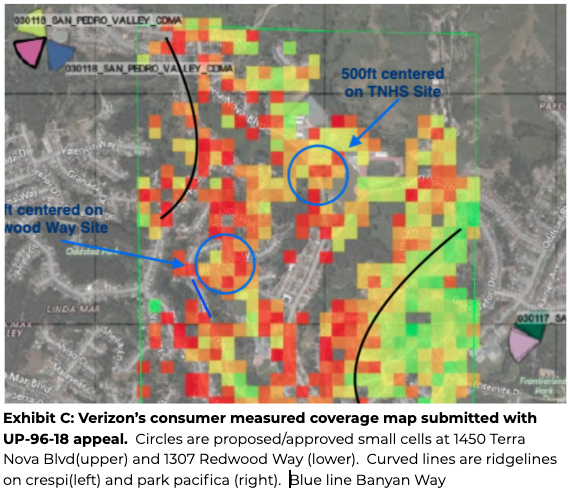All of the following articles have been vetted by the Cal Coast for Responsible Tech Team. If you have any concerns about incorrect or misinformation please contact us at info@calcoastresponsibletech.com
Author: Sunil Bhat
The appeal of the 1307 Redwood Way Close Proximity Microwave Cellular Antenna is scheduled for 11/30 at 7PM. The City approved this antenna in June for a utility pole 17 feet from a 9 month old’s nursery and crib. Verizon and the City delayed the appeal by 2 months saying they were looking for alternate sites, their new proposal is just one block away at 1334 Lerida Way, on the edge of Ortega School property.
The city has the legal right to deny these antennas based on the City’s aesthetic standards, which are part of the Municipal Code. The maps Verizon presented are extremely inconsistent, and show a very large gap in coverage, that one small cell, that they say covers 500-1000ft, will be unable to fill. If they approve this site, they will be placing these antennas on utility poles every few blocks all over Pacifica.



Please use the Sample Emails to tell City Council that there is sufficient evidence of unsafe radiation levels in close proximity to “small cell” antennas. At the very least, they should wait for the antenna at the high school, just 1500ft away from the Redwood Way site, to see how that affects the local signal coverage.
If you would like more information about the health effects of wireless radiation, please watch this 25min info session video
Original Article: https://rappler.com/technology/features/what-you-need-to-know-surveillance-capitalism
August 31, 2020 – Gelo Gonzales
Understand the basics of surveillance capitalism, the business model predicated on harvesting human behavior
We had been living in a Black Mirror world; we just didn’t know it.
When we started joining social networks in the early 2000s such as Friendster, MySpace and Multiple, and started using online tools such as Google Search, Yahoo Messenger or Yahoo Groups, all we did then was marvel at all these new technologies, maybe wondering occasionally how these amazing services could be free.
At some point, we figured it was through online ads. The more eyeballs on a website, the more money the site makes. That was not wholly incorrect. But as we’ve slowly come to learn in the years that followed, and as two companies eventually came to dominate – Google and Facebook – we’ve come to realize that the whole business had been more insidious and sinister than that.
Today, there is a term that encapsulates what business the two tech giants are in, beyond the veneer of tech altruism and “connecting the world” or “organizing the world’s information” – surveillance capitalism.
Coined in 2014 by American author and scholar Shoshana Zuboff, the term describes the business model predicated on harvesting user experience through online platforms, smartphones, smartwatches, apps, and other devices, and manipulating behavior for monetization.
It is the subject of her 2019 book, The Age of Surveillance Capitalism: The Fight for a Human Future.
Having even a basic understanding of it is crucial to understanding, some of our behaviors today as we live increasingly in the digital sphere, and vital to our awakening and fighting back against the perverse ways that technologies today have been shaped by a harmful economic imperative.
Zuboff, in her book, repeatedly compares surveillance capitalism to industrial capitalism and industrialization, which have had devastating consequences to nature. She asks, what then will be the toll of surveillance capitalism, left to their own devices. (The short of it: not good.)
Zuboff has explained the concept through interviews as well, such as this one by the Centre for International Governance Innovation, and on an online panel via Access Now:
Here are some of the basics, derived from those interviews:
Surveillance capitalism makes its money by predicting what a person will do in the future
(READ: Explainer: what is surveillance capitalism and how does it shape the economy)
“They compete on the basis of who has the best predictions — in other words, who can do the best job selling certainty,” said Zuboff in an interview.
To make the best predictions, surveillance capitalists need a ton of data
“We are their source of raw material, nothing else. These predictions are now sold to business customers, because a lot of businesses are very interested in what we will do soon and later. Never in the history of humanity has there been this volume and variety of behavioral data, and this kind of computational power to monitor and predict human behavior from individuals to populations,” said Zuboff.
For years, they were able to do this under our noses
One major indication that the consumer is not the customer is that there is what Zuboff calls a surplus on behavioral data. There is an excess of data being collected beyond what is needed for mere service improvement – although that is what tech companies would want people to believe.
From sneakily stealing and commodifying human experiences, they move to manipulating behavior
Before we all learned what Facebook and Google were doing, never at any point did the two companies explain what was happening behind the scenes. It was likely hidden in the fine print, designed – as any other fine print in the world – to be tedious to read.
“Eventually surveillance capitalists discovered that the best source of predictive data is to actually intervene in people’s behaviour and shape it.” They commandeer and “modify our behavior in the direction of its preferred commercial outcomes.”
Pokémon GO’s dark side
One of the examples of manipulation that Zuboff provides is Pokémon GO, which uses augmented reality and map data to play.
While Nintendo owns the license to the Pokémon franchise, Pokémon GO was developed by Niantic Labs, which is actually a company spun off from Google.
People were herded to real locations to capture a Pokémon, with Google’s Niantic Labs putting Pokémon to capture in commercial establishments that would pay, thus giving them foot traffic. For players, on the other hand, it may seem like they were only playing a game.
This example, along with all the many others, are why you hear that expression about data being as valuable as oil, about human experience being as valuable as oil. It is. And the companies have been allowed to drill freely.
This market, this system is completely undemocratic, asserted Zuboff. People and their experiences have been used as raw material in a market from which they gain no benefit, their actions creepily recorded for the benefit of the highest bidders, and their actions and behavior manipulated to perpetuate the system. (READ: Threaten to shut down online platforms to create leverage, says ex-Facebook investor)
“These systems are a direct assault on human agency and individual sovereignty as they challenge the most elemental right to autonomous action. Without agency there is no freedom, and without freedom there can be no democracy.”
Zuboff equated the human futures market to slave markets, the human organs trade, and human trafficking, and called it “pernicious and violent” and “fundamentally incompatible with democracy.” Those markets have been outlawed, criminalized, and made illegal. And the same must be done to the human futures market, and to surveillance capitalism, Zuboff said.
Surveillance capitalism is vampiric. But people gladly invited its practitioners into their homes and into their private lives, because when the companies had first knocked, they didn’t have the courtesy to show us their fangs. – Rappler.com